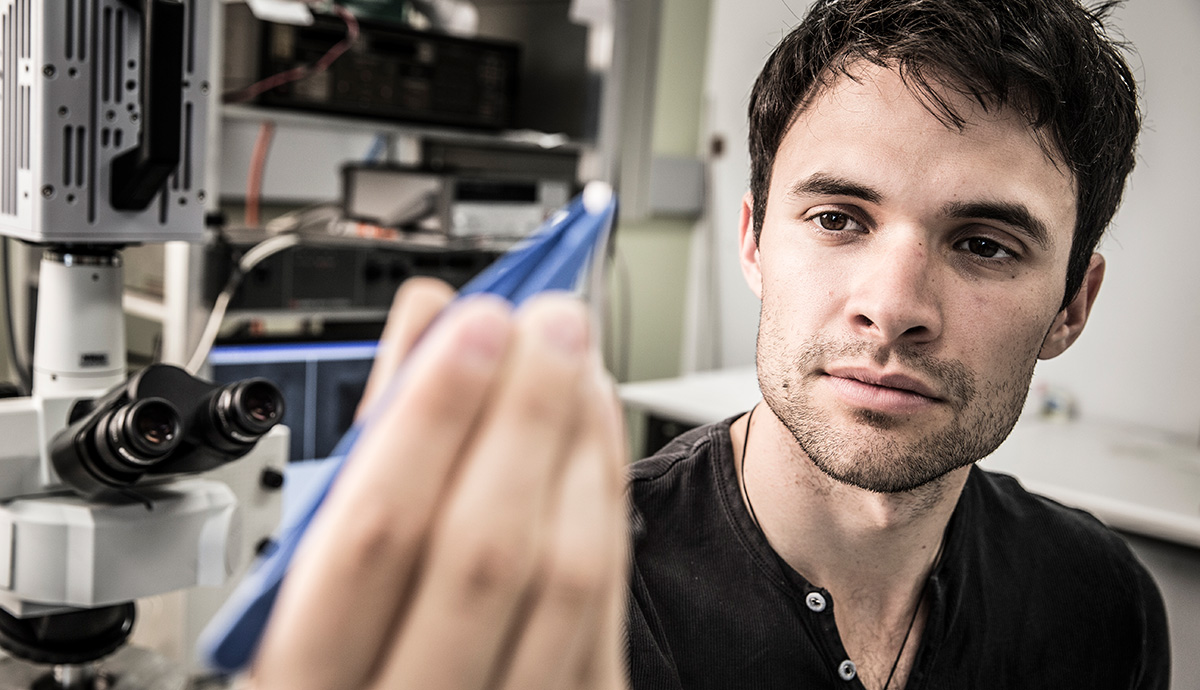September 30, 2015
Physics buff helping to create next-generation electronics
Meet the PhD student whose cutting-edge work on superconductors is helping to create new materials and electronics.
From hoverboards and levitating trains to energy-saving power lines and faster electronics, superconductors are being used to create futuristic next-generation devices.
And for boisterous 25 year-old PhD student Frederick Steven Wells, from UOW’s Institute for Superconducting and Electronic Materials (ISEM) and School of Physics, this important research field could not be more exciting.
“Superconductors sound really dull to anyone who’s not in the field, but anyone who knows me knows that I don’t do dull. For me, everything has to be colourful and exciting.”
“Superconductors have so many practical uses, and so many possibilities. A lot of people have probably seen the Lexus hoverboard that came out recently. And there’s also the magnetic shields that were proposed by NASA to protect astronauts from radiation.”
“If you’re into more down-to-earth things, then we can make more efficient wires and energy-saving power lines, as well as faster electronics for computers that don’t overheat. And if you’ve ever had an MRI, you’ve used superconductors.”
Superconductors are special materials that don’t have any resistance, meaning they don’t lose any energy as electricity travels through them, making them much more efficient than traditional conductors, such as copper.
Frederick is on the cutting-edge of the sphere; researching how magnetic fields work in superconductors to help create next-generation electronics such as super-sensitive light detectors for deep space telescopes and high-performance, low-energy computers.
The winner of UOW’s Three Minute Thesis competition, in which research students are challenged to explain their work to a lay audience in just three minutes, Frederick said he chose to study physics on a “whim” after having good marks in maths at high school.
“It must have been a good choice, because eight years later here I am: still going strong, and loving it!”
“I’m just so passionate about learning new things – always have been. And superconductors are fascinating. They have properties so different to anything we see in our usual life: like being able to completely push out magnetic fields,” he said.
“The deeper you look into it, the more there is to see, and that’s what captivates me.”
Frederick, who completed a Bachelor of Science (Physics) at UOW before starting his PhD at ISEM under the supervision of Professor Alexey V Pan, has just returned from a superconducting conference in Geneva, where he rubbed shoulders with Nobel Prize winners in the field.
“I was legitimately more excited and star struck to be there than if I was at a Hollywood red carpet,” Frederick laughed. “There have been five Nobel Prizes for superconductors, and I watched talks from two of them.”
After Frederick submits his thesis at the end of the year, he hopes to continue his research and start teaching.
“I want to delve so deeply into the work that I find something that makes me worthy to stand at the front of these giant lecture halls [at industry conferences]. And not just to impress other scientists, I want to share things with the world.”
Frederick also hopes to one day follow in the footsteps of famous science media personalities Dr Karl Kruszelnicki and Professor Brian Cox and help bring science to the masses.
“I have such a passion for teaching, I want to become the next famous science dude on TV explaining the world to people.”
“That all seems like a wild dream and I don’t know when I’m going to get there, but someday.”
Frederick will represent UOW at the Trans-Tasman Three Minute Thesis Competition at the University of Queensland on Friday 2 October.
